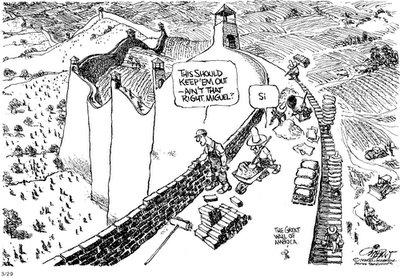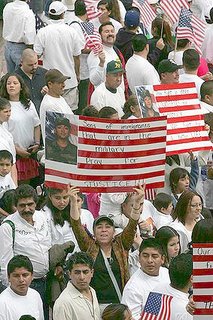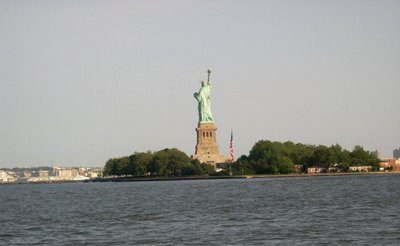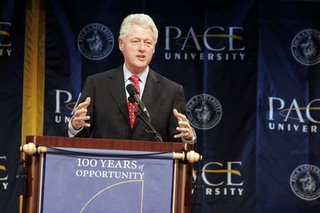Immigration: We Wanted a Labor Force, But Human Beings Came
 When the Law Doesn't Reflect Reality
When the Law Doesn't Reflect Reality
Many arguments aren’t always being debated on their merits; people try to rationalize a position they've taken already often regardless of the fact.
Diversion, trickery, and intellectual dishonesty are tools for those who don't care to have an open discussion. Their mind is religiously set on a position, (however they frame the issue), and what evidence falls outside this frame is discarded.
I think this is the case with the immigration discussion—if you call it that—we’re having today. No one would admit to being xenophobic, not outright anyway, but, if you carefully dissect their arguments and further examine their political affiliations then their xenophobia becomes more obvious.
Most of the arguments today aren’t new at all. They’ve been re-circulated every so often since the 1800s. Terrorism, is the new factor, but, heck, preventing terrorists from entering our country has little to do with a sane immigration policy. All the terrorists involved in the 9-11 attacks, (and a couple others arrested), came into this country legally; they didn’t risk the arduous trek most illegal immigrants take. Like the broken immigration system, our intelligence agencies couldn't put all the available evidence together to prevent the 9-11 terrorist attacks. [The would-be highjackers had been spotted, several times, but no action was taken because nobody connected the dots].
Plainly put, it's a matter of being smart and efficient with our laws & tools at our disposal; and when those laws or methods don't work, we should revise them rationally not out of fear. Fear is not a good adviser in making prudent decisions. But, as the 9-11 tragedy and the failed Iraq war have proven, people who aren't honest with the facts are doomed to failure!
We’re not having an honest debate, and, from what I’ve seen thus far, I don’t like the proposed legislation. Therefore, I’m in favor of failure! This Congress can’t pass meaningful and appropriate legislation to tackle the immigration issue, so it’s better that we wait a bit longer. Perhaps the Democrats will re-gain control of the House and may come up with a more sensible proposal next year. This kind of legislation isn’t revisited often, so if we get something bad now, it will stay on the books for a very long time. It's a tough pill to swallow for those who are caught in the insanity of the present system, but half measures aren't prudent right now.
The xenophobes point to the non-English ancestry immigrants as groups that resist integration, politically and culturally. I don't buy this, but even if this were so, what’s the harm? Having enclaves with different-looking and speaking people? So what? It has always been the case in our history; when adult immigrants make a transition from one country to another. It’s hard to master a language when you’re older, work very hard to make a living, and have little time for leisure.
And yet, immigrants do make the effort to learn English and fit it. There are long waiting lists for second-language programs.  We know that by the third (if not the second) generation, there's a rapid change and integration in the greater society . It’s a fact that the children of the immigrants throughout (our American experience) have assimilated well and have had a faster socio-economic mobility than the older groups!
We know that by the third (if not the second) generation, there's a rapid change and integration in the greater society . It’s a fact that the children of the immigrants throughout (our American experience) have assimilated well and have had a faster socio-economic mobility than the older groups!
The chairman of the Senate Judiciary Committee on Immigration, Arlen Specter (R-PA), is the son of two immigrants! [his mother came from Russia and his father from eastern Europe]. I'm sure his parents weren't fluent (if at all) English speakers. Within one generation, this household produced a US Senator!
All immigrants realize the benefits from being fully integrated in the society at-large. It just takes some time for it to happen. While they're trying to achieve their American Dream, they contribute in many ways, and as a group are much less likely to be a "public charge" than other "native" groups.
Patriotism? The vast majority of people who come to this country are no less patriotic than the rest. Have you seen how many non-citizens have served and died in our wars? They’re “green card” holders fighting for a country where they cannot vote in. Do you pay attention to the names of those killed in Iraq every day? Do you recognize how many have Latino and Asian surnames? They are the sons & daughters of relatively recent immigrants if not immigrants themselves. We know immigrants pick our produce, serve us food, and clean our bathrooms, but they also risk their lives for America.
The Cons and Faux News have been saying, “gut welfare” to eliminate the “freeloading illegals”! Whatever. Sometimes their arguments are so ridiculous that don't merit a response. Welfare and abuse isn't a trait of the immigrants. As for wasting money, sure, let's try to do this. Where's the abuse and by whom?
The problem is how we spend our money. It's a matter of priorities and of ..impressions. It also depends where you look or where you don't. People can easily see the drunkard who loiters around the neighborhood while he receives food stamps, health care benefits, and whatever else from society. Ah, that’s why we need to pull the safety net, they say. Let's get real here. Abuse occurs, and the system is far from perfect. We have to compare the cost to the benefits and not destroy social programs but reform them.
It also depends where you look or where you don't. People can easily see the drunkard who loiters around the neighborhood while he receives food stamps, health care benefits, and whatever else from society. Ah, that’s why we need to pull the safety net, they say. Let's get real here. Abuse occurs, and the system is far from perfect. We have to compare the cost to the benefits and not destroy social programs but reform them.
What's hard to see, and harder to make an immediate connection with, is how the system gives a lot more to those who have lots already. Tax heavens, no-bid huge contracts, favorable laws & regulations, and so forth, are all part of a skewed economic system that favors the wealthy and whereas the gap between the elites and the rest has taken obscene proportions.
Yeah, but if we were to eliminate the essential education and health care for the immigrants and their children we'd help balance the budget, some argue. Education is the key to a better society. Those who stick around, legally or illegally, do better themselves and the whole country benefits too. Not to mention that an educated person is less likely to contribute to crime--and we pay for it dearly.
Surely, it's a matter of priorities. Hey, look over there: we’ve committed to spending almost a trillion dollars (and countless human lives) because it seemed like a good idea to be a “war president” and “bring freedom & democracy to the world.” Besides, they knew that there would be a transfer of wealth during the war [guess which way?] while the costs of this ill-thought exercise wouldn’t be proportionally shared by all. Some even spoke of patriotism while their fat corporations had a fax machine as "headquarters" off-shore to avoid paying taxes! [bonus question: What's an "American" company based in the Bahamas that recently got a multi-billion dollar no-bid contract from the Dept of Homeland Security? Clue: For the answer, contact the Repub. leaders in Congress who didn't allow discussion on the subject, despite objections from members of both parties.]
I remember, not so long ago we were being bombarded with the slogan “a culture of life”! I remember, I didn’t like their definition, nor did I trust the people who were promoting it. They never explained if this culture of life would be ..funded. You’re on your own, more or less, because they don’t believe in a state that can play a positive role in truly enhancing the quality of life when it matters. Again, it's a matter of priorities, and the responsibility is a two-way street.
The immigration reality presents us with a challenge, but if we have to make tough choices, we must be honest and discuss the facts, not peddle superstition, or allow to be deceived by illusions and false premises. Columnist Paul Krugman of the NY Times brought up some “uncomfortable facts about immigration” [3/27/06] He argues that the low-skill immigrants threaten to unravel the safety net of our social net—which, he acknowledges, is full of holes. He says, “basic decency requires that we provide immigrants, once they’re here,” with all sorts of benefits. Yet, several sources reveal that illegal immigrants pay about $8-9 billion every year for Medicare and Social Security taxes. Where's this money, year after year?
But they broke the law! Well, yes, but the punishment should fit the crime. The vast majority of them have lived responsible & productive lives within the law since their original trespass. Any illegal can’t afford to be apprehended for any serious legal violation because this would result in deportation. Most, some 70%, have been in the country more than 5 years! These immigrants come here because they need a job, want to improve their lot, and reunite with family members. Most have been exploited by American employers.
We have already given amnesty to all those American businesses that have benefited from this hard-working & underpaid labor pool. The plain truth is that a great number of the immigrants are essentially citizens already. We have to recognize this fact. The test of citizenship is, in my estimate, more than a formal exam in civics--an exam that most "bona-fide" Americans would fail. It's a rational and an emotional decision to be an American. Once the decision is made, then you measure the commitment and the contributions the individual makes to his adoptive country.
The law itself is not very rational in my estimate. It’s a failed law. It’s not a good law. Let me give you another example: Millions of Americans buy drugs from Canada because they can’t afford to buy them here. The health care/Medicare system is a mess. Yes, there are laws, some passed in the last 2-3 years. Well, be honest, if you needed a prescription drug for your health and couldn't get it here (for whatever reason), you’d buy it from abroad even if this meant that you’d be breaking the law!  As a country that needs immigrants, for their labor and for their varied contributions, we have to treat them as human beings and bring them from the underground into the light of respect and legal status.
As a country that needs immigrants, for their labor and for their varied contributions, we have to treat them as human beings and bring them from the underground into the light of respect and legal status.
We've been chasing the exploited but not the exploiters. If there are jobs not being filled by Americans then we should welcome those who can do them, and we do it in such a way as not to create a labor underclass. The employers have benefited by keeping wages low, because the illegals can't ask for more. Of course, there are some Americans who don't want to discuss the facts because they prefer the present situation to a sensible reform. Giving rights and being fair to a whole new class of people will also impact our way of life. I think for the better, but not everybody agrees with me.
The price for reform maybe too high for some Americans if they have to pay higher prices for produce, to have their lawns mowed, and go without the maid one day of the week. But then if we start on the reform path, we may have to deal with human trafficking & sexual trade/exploitation going on in our country today--another facet of our broken immigration law that deters these people from coming forward if they're illegally here.
Keeping people in the shadow of the law and in the underground may seem like a good idea to those who aren't willing to face reality or put some effort in dealing with a serious problem.


















